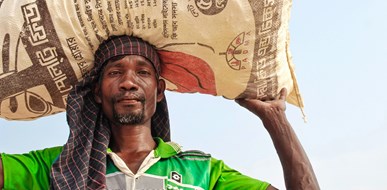[New publication] New pathways toward supply chain accountability
Published 13 January 2025
Utsab Ahamed Akash - Photograph of a Man Carrying a Sack
The amount of due diligence standards regulating supply chains is rapidly increasing worldwide. In a recent symposium published in the American Journal of International Law Unbound, researcher León Castellanos-Jankiewicz and his co-authors bring much-needed clarity on the meaning of these new measures.
The symposium examines the EU Corporate Sustainability Due Diligence Directive (CSDDD), a major legislative adopted last year requiring companies to actively prevent rights violations and environmental harm throughout their supply chains. The Directive orders companies to identify risks and set up strong monitoring and accountability systems, transforming how companies interact with their stakeholders.
Legislation promoting supply chain accountability is becoming increasingly common. Within Europe, France, Germany, Hungary, the Netherlands, Norway, and Switzerland have already enacted due diligence and transparency laws, with Austria, Belgium, and Luxembourg currently debating similar proposals. This trend extends beyond Europe, with Australia, Canada, the UK, and the United States having laws focused on preventing forced labour and modern slavery.
Implementation challenges
The latest legislative proposals are facing an increased backlash, with large companies complaining of over-regulation and, in the case of smaller businesses, of existential threats. At the same time, national courts continue to invoke due diligence standards, yet ascribe to them varying degrees of substantive and procedural significance. To navigate these developments, León Castellanos-Jankiewicz, together with Tibisay Morgandi (Queen Mary University London) and Sergio Puig (European University Institute) curated the AJIL Unbound symposium addressing human rights, labour standards, climate change, and the environment. The texts cover the application of due diligence standards in domestic courts and new forms of liability under tools like the CSDDD. The essays were written by renowned experts and scholars Carsten Koenig, Humberto Cantú Rivera, Tibisay Morgandi, Jason Rudall, Jowita Mieszkowska and Sarah Vandenbroucke.
As 2025 marks a pivotal year for the transposition of this Directive, this publication is a must-read for academics, lawmakers, corporate leaders, and legal practitioners.
[Spring academy] Explore the digitalisation of sustainability due diligence (07-10 April 2024)
As large European companies face legal requirements to carry out sustainability due diligence, the question of how this new form of transnational governance is implemented has become more critical than ever. Many organisations are turning to digital solutions like AI, blockchain, data mining, and survey tools to embed sustainability into their operations and mitigate risks of adverse human rights or environmental impacts.
Join us for our innovative four-day training programme on the digitalisation of sustainability due diligence (07-10 April 2025). This course combines theory and practice, featuring lectures by academics and workshops led by industry experts. You will gain a deep understanding of key technological solutions for sustainable due diligence, empowering you to drive responsible business practices. Read more.
About the author
Dr León Castellanos-Jankiewicz is a senior researcher in international law at the Asser Institute. His work focuses on the human rights implications of irresponsible arms trade and the history of public and private international law. The symposium on EU Corporate Sustainability Due Diligence is based on a workshop which he co-organised with Tibisay Morgandi.
Read more
[Interview] Antoine Duval: 'Human rights due diligence is underpinned by a fundamental double movement'
Antoine Duval is a senior researcher at the Asser Institute where he focuses on transnational private regulation and business and human rights. In an article in the Nordic Journal of Human Rights, he examines the background of human rights due diligence, in particular how prof. John Ruggie envisioned the interaction between the public and private. 'Human rights due diligence is underpinned by a fundamental double movement.' An interview. Read more.
EU scrutinises arms export controls as focus shifts to supply chain accountability
Today, EU stakeholders, including Asser Institute researcher León Castellanos-Jankiewicz, are meeting in Brussels to discuss export controls for conventional arms during the Working Party on Conventional Arms Exports (COARM). Intergovernmental bodies are increasingly focusing on supply chain accountability to ensure responsible arms trade. Castellanos-Jankiewicz: “It will be interesting to see how states interpret their obligations to conduct risk assessments prior to deciding on exports.” Read more.
[Law clinic] Seeking transparency on arms exports
Recently, a new edition of the international law clinic on ‘Access to Justice for Gun Violence’ was launched by the Amsterdam International Law Clinic of the University of Amsterdam in cooperation with the Asser Institute and the European Center for Constitutional and Human Rights (ECCHR). The pro bono clinic will address access to information for arms exports from the standpoint of European legislation and international human rights law. Read more.
[Interview] Nadia Perrone: ‘We are at a pivotal moment in defining new responsibilities for powerful non-state actors’
Nadia Perrone is a visiting research fellow at the T.M.C. Asser Instituut. During her stay at the Asser Institute, she is conducting research on the use of business and human rights soft law in domestic litigations. Nadia Perrone: “I would like to demonstrate that the main business and human rights initiative, the UNGPs, can no longer be considered to be soft law”. An interview. Read more.

